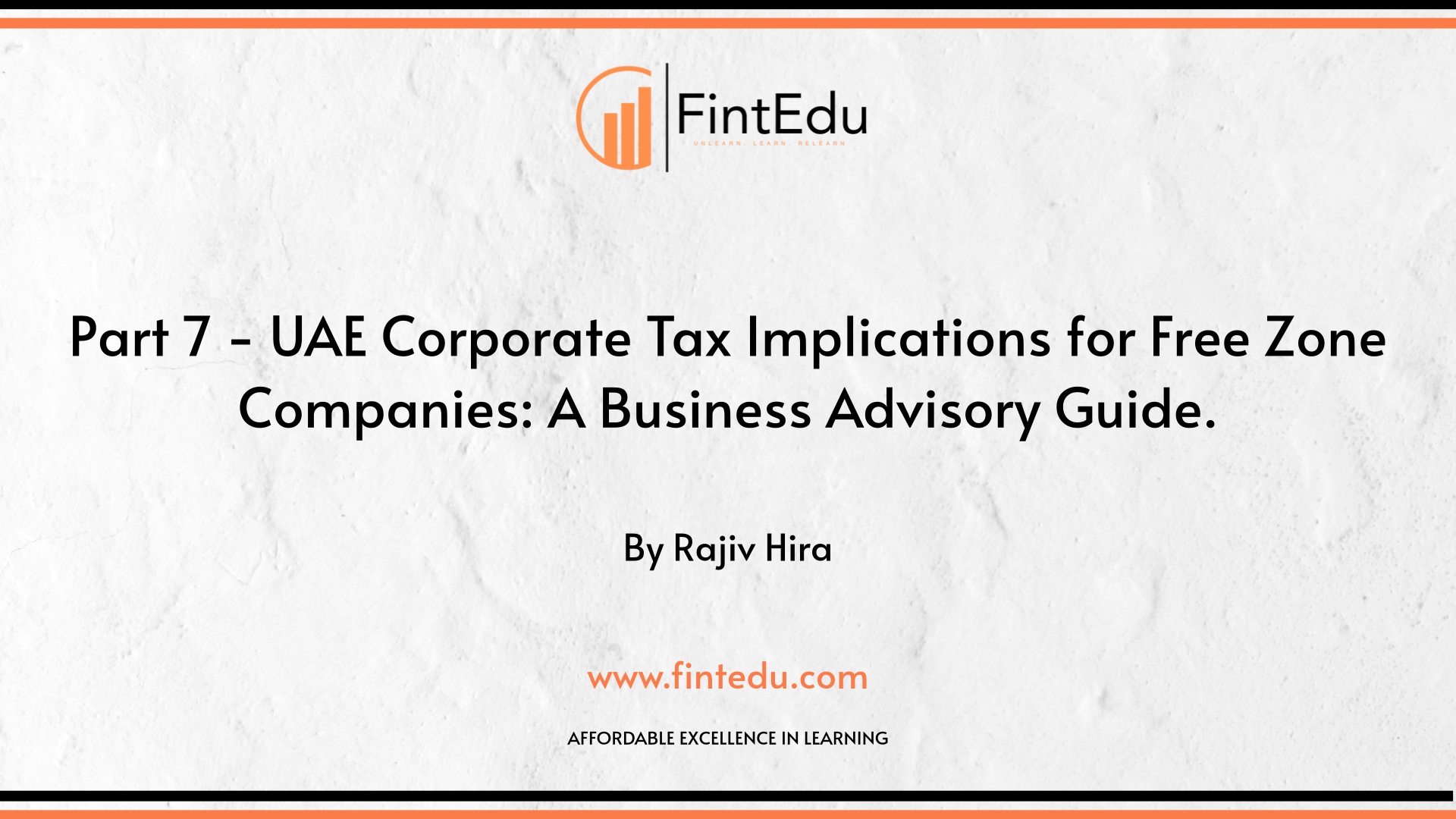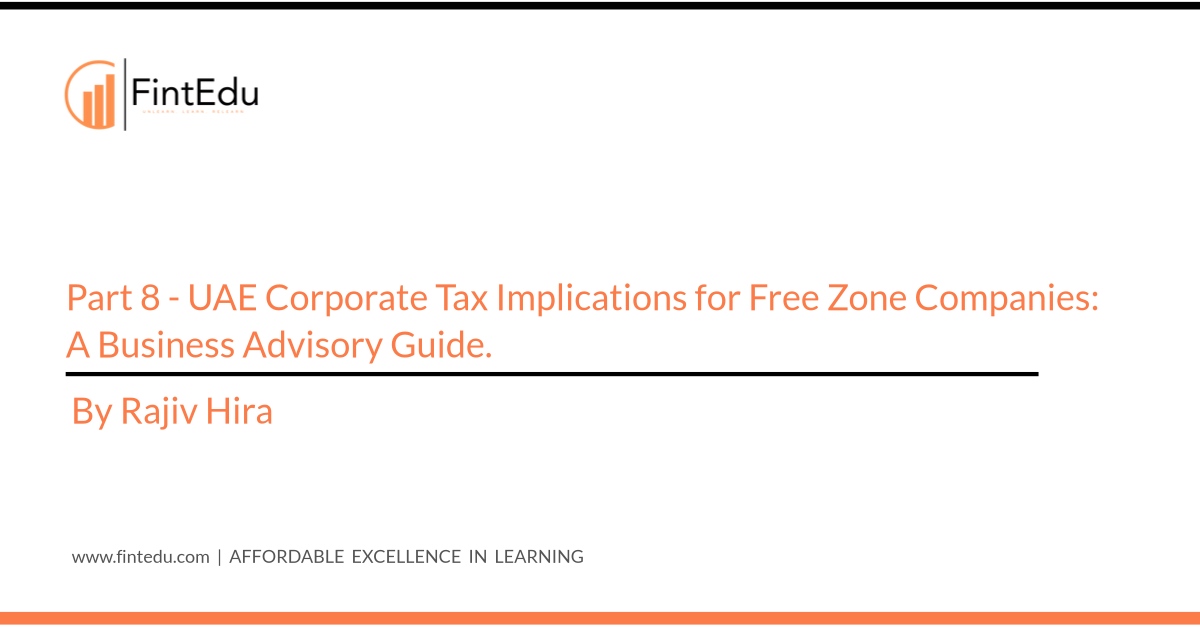LISTEN TO THIS ARTICLE
SMEs / Boutiques: Many financial services firms in Free Zones are boutique firms, e.g. a small asset management firm with a few principals managing funds, or a family office managing private wealth. These firms often have few employees but potentially significant profits relative to their size (especially if performance fees or investment gains are realized). Being in a Free Zone, they chose it likely for 0% tax assurance; now they must ensure compliance to keep that. Such firms should be cautious about the scope of services they provide. For example, a wealth manager should stick to advisory and portfolio management (qualifying) and not start offering, say, insurance brokerage or some consumer financing directly, which could be seen as excluded. They also must handle compliance: even if small, if they have any related-party dealings (perhaps the owners also have another company that they charge or pay fees to), they need to record it at arm’s length. Audits may require them to improve their bookkeeping.
Transfer pricing documentation might be required if they cross thresholds (though the threshold for documentation is expected to be high, possibly annual revenue of AED 200million, which many boutique firms won’t hit, but the law’s condition implies some level of documentation regardless).
Large Corporates: Large financial companies in Free Zones include global asset managers, reinsurance companies, and financing arms of multinationals. These companies will benefit from the clearly delineated rules – e.g. a big reinsurance firm in DIFC / ADGM will enjoy 0% on underwriting income (an attractive incentive to base operations there). They will, however, have complex transfer pricing arrangements to manage: for example, reinsurance pricing with affiliates, or fund managers charging fees to funds that could be offshore. They must ensure these are at market and properly documented. Another area is profit distribution: a branch of a foreign company in a Free Zone (say a foreign bank’s booking center that is technically not a “bank” but a booking vehicle) might be tempted to be QFZP if not doing classical banking. However, the activities could be scrutinized if they resemble excluded ones.
Large financial groups may also consider using multiple entities to separate qualifying from non-qualifying lines. For instance, an insurance group could put its reinsurance book in a Free Zone entity (0% tax) while its primary insurance book remains in a mainland entity (taxable), effectively splitting the business by line to optimize tax. Such structuring must be robust from a regulatory perspective and have commercial rationale, but it’s feasible.
Real-World Scenario: Example: G% Asset Management Ltd (DIFC) manages a fund for clients and also has a small advisory unit that advises individual investors on financial planning. Managing the fund yields it performance and management fees (Qualifying Activity: fund management). Advising individual investors is part of wealth management (also qualifying). All income is from these qualifying services and thus at 0%. G% must ensure that any ancillary service (e.g. if they escrow client money or do something like an insurance referral) doesn’t become significant or is structured separately. They get their accounts audited and file a return showing all income as qualifying. Now suppose G% also had a division that provided lending to the public (say they started a small consumer lending portfolio) – that would be an Excluded Activity (providing financing to non-related parties) and any interest income from it would be non-qualifying. If that grew beyond 5% of revenue, G% would lose its QFZP status. So instead, G% spins off the lending idea into a separate mainland finance company, keeping G% Ltd purely focused on asset management. This way, G% remains tax-exempt, and the new entity is taxed normally on the lending business. A larger firm, like an international bank, simply cannot avoid being taxed if it’s doing mainstream banking; such a bank might use its Free Zone presence for booked transactions that are more tax-efficient (like trading through a QFZP entity if possible), while conducting core deposit/lending through its branch that is fully taxable.In the finance sector, the rules incentivize investment management and specialized financing over general banking or insurance. Businesses in this sector should clearly define their activities and possibly use separate vehicles for different lines to ensure the qualifying parts stay pure. The Free Zone 0% regime gives them a competitive edge (for example, attracting hedge funds to be managed from UAE with no corporate tax is a selling point). Compliance with regulatory and tax laws will go hand-in-hand here, given these companies are usually regulated by financial authorities (Financial Services Regulatory Authority (FSRA) / Dubai Financial Services Authority (DFSA)) as well.
Disclaimer: Content posted is for informational and knowledge sharing purposes only, and is not intended to be a substitute for professional advice related to tax, finance or accounting. The view/interpretation of the publisher is based on the available Law, guidelines and information. Each reader should take due professional care before you act after reading the contents of that article/post. No warranty whatsoever is made that any of the articles are accurate and is not intended to provide, and should not be relied on for tax or accounting advice.
Related Articles
Part 1 - UAE Corporate Tax Implications for Free Zone Companies: A Business Advisory Guide
Part 2 - UAE Corporate Tax Implications for Free Zone Companies: A Business Advisory GuidePart 3 - UAE Corporate Tax Implications for Free Zone Companies: A Business Advisory Guide
Part 4 - UAE Corporate Tax Implications for Free Zone Companies: A Business Advisory Guide
Part 5 - UAE Corporate Tax Implications for Free Zone Companies: A Business Advisory Guide.
Part 6 - UAE Corporate Tax Implications for Free Zone Companies: A Business Advisory Guide.
Part 7 - UAE Corporate Tax Implications for Free Zone Companies: A Business Advisory Guide.
Part 9 - UAE Corporate Tax Implications for Free Zone Companies: A Business Advisory Guide.
Contributor
Related Posts

@@PLUGINFILE@@/Part%209%20-%20UAE%20Corporate%20Tax%20Implications%20for%20Free%20Zone%20Compa...
Read More
@@PLUGINFILE@@/As%20we%20approach%2031%20March%202025%2C%20businesses%20with%20a%20VAT%20year%...
Read More
@@PLUGINFILE@@/Part%207%20-%20UAE%20Corporate%20Tax%20Implications%20for%20Free%20Zone%20Compa...
Read More